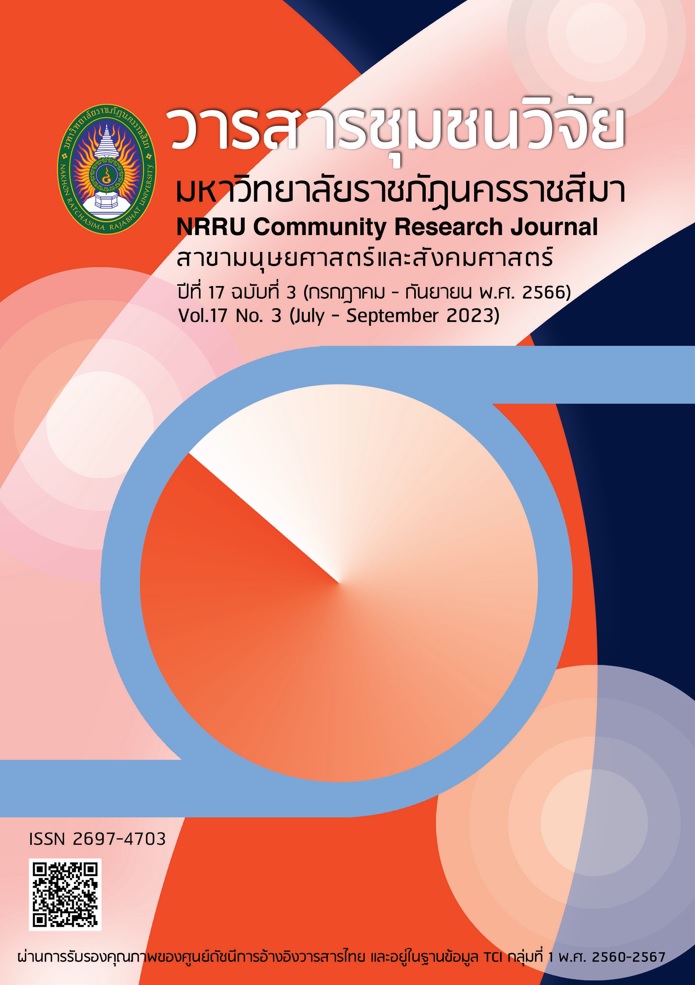A STUDY OF LEARNING ACHIEVEMENT ON BIO-HACKER LEARNING UNITS AND ANALYTICAL THINKING ABILITY OF 4th GRADE ELEMENTARY SCHOOL STUDENTS USING PHENOMENON-BASED LEARNING
DOI:
https://doi.org/10.14456/nrru-rdi.2023.45Keywords:
Phenomenon-based learning, Analytical thinking ability, Learning achievementAbstract
Applying knowledge from real-life Phenomena enhances the analytical thinking abilities of students. This research aimed to study the learning achievement on bio-hacker learning unit during before and after learning, using a criterion of 70 percent, and compare analytical thinking ability before and after learning through Phenomenon-Based Learning. A sample group of 16 Grade 4 students was selected through a cluster random sampling from Grade 4 students. The research instruments consisted of Phenomenon-based learning lesson plan with appropriate value of 4.64, an achievement test with a reliability (KR-20) of 0.91 and analytical thinking ability test (KR-20) of 0.86. Data were collected using pre-test and post-test, and teaching was conducted using a learning management plan. Students’ achievements and analytical thinking ability were evaluated. Data were analyzed using descriptive statistics, t-test, and Willcoxon Signed-Rank test. The research findings showed that: 1) the learning achievement after using Phenomenon-based learning was significantly higher than before learning at the 0.05 level, 2) the learning achievement after using Phenomenon-based learning was significantly higher than 70% criterion at the 0.05 level, and 3) the analytical thinking ability after using Phenomenon-based learning was significantly higher than before learning at the 0.05 level. This indicates that students benefited from hands-on learning experiences. As a result, students achieved higher learning achievement and analytical thinking abilities.
References
Aksornkan, S. ( 2019). The Study of the Analytical Thinking Ability of the Students in Faculty of Education, Suratthani Rajabhat University. Ratchaphruek Journal, 17(2), 24-32. (In Thai)
Bloom, B. S., Krathwohl, D. R., & Masia, B. B. (1956). Taxonomy of education Objective the Classificationof Educational Goals. New York : David McKay Company.
Chaiwon, T., & Nugultham, K. (2021). Phenomenon-based Learning: Integrated leraning for enhancing Learners’ knowledge in the real world. Graduate Studies Journal Valaya Alongkorn Rajabhat University in the Royal Patronage, 15(2), 251-261. (In Thai)
Chuysawat, T., Chauvatcharin, N., & Thongsorn, P. (2021). The enhancing of learning achievement and critical thinking skill for eleventh grade students using the Phenomenon-based Learning. Academic Journal Education, 22(1), 1-17. (In Thai)
Dammak, P., Pana, S., & Boonpook, W. (2022). A Study of Analytical Thinking skill and Learning Achievement BBy Phenomenon-based Learning in social Studies Subject. Journal of Educational Technology and Communications Faculty of Education Mahasarakham University, 5(15), 36-48. (In Thai)
DongJit, J. (2021). The application of E-learning on learning management phenomenon-based Learning approach. Journal of Educational Burapha University, 32(3), 1-10. (In Thai)
Institute for the Promotion of Teaching Science and Technology, Ministry of Education. (2008). Measurement and Evaluation Guide. Science. Bangkok : Institute for the Promotion of Teaching Science and Technology, Ministry of Education. (In Thai)
Institute for the Promotion of Teaching Science and Technology, Ministry of Education. (2017). Indicators and learning Content The core of the science learning curriculum of basic education. Bangkok : Teachers Council of Ladprao. (In Thai)
Institute for the Promotion of Teaching Science and Technology. (2022). Study design of future. Bangkok : Charansanitwong Printing. (In Thai)
Keeratichamroen, W., & Phonnong, I. (2020). A comparison of learning achievement and communication skills for undergraduate students using 5E inquiry-based Leraning and Phenomenon-based Learning. NRRU Community Research Journal, 14(1), 29-43. (In thai)
Khammanee, T. (2016). Pedagogy: The Body of Knowledge for Effective Learning Process Management (20th ed.) Bangkok : Chulalongkorn University Press. (In Thai)
Kompa, J. S. (2017). Remembering Prof. Howard Barrows: Notes on Problem-Based Learning and the School of the Future. Retrieved November 6, 2022, from https://joanakompa.com/tag/phenomenon-based-learning/
Luenam, K. (2021). Educational research methodology. Nakhon Ratchasima : Korat marketing and productions. (In Thai)
Mahavijit, P. (2019). Application of Phenomenon-Based Learning and active Learning in education course to enhance 21st Century learning skills. Journal of Education Khonkean University, 42(2), 73-90. (In Thai)
Ministry of Education. (2017). Basic Education Core Curriculum, 2008. Bangkok: Thailand agricultural Cooperative Assembly Printing House. (In Thai)
Moonkham, S. (2007). Teaching strategies for analytical thinking (4th ed.) Bangkok : Print. (In Thai)
Office of the Basic Education Commission, Ministry of Education. (2017). Indicators and core learning content Science and Technology learning group (Revised edition 2017) according to the Basic Education Core Curriculum, 2008. Bangkok : Agricultural cooperative printing demonstrations of Thai. (In Thai)
Phuphrawittayakhom School. (2021). Educational institute curriculum. Chaiyaphum : Educational service Area Office Chaiyaphum Secondary school. (In Thai)
Pibool, O., & Suthasinobol, K. (2021). Phenomenon based learning for the development of Travsversal competencies: A case study from Finland. Journal of Liberal Art of Rajamangala University of Technology Suvarnabhumi, 3(3), 414-428.
Samahito, C. (2019). Phenomenon-based learning experience provision for young Children. Silapakorn University Journal, 39(1), 113-129. (In Thai)
Srisa-ard, B. (2017). Preliminary research (10th ed.). Bangkok : Suweeriyasan. (In Thai)
Tanya, S. (2013). Educational Research Methodology. Nakhon Ratchasima : Rajabhat University Nakhon Ratchasima. (In Thai)
Tassaniyom, A., & Chookhampaeng, S. (2020). Developing analytical thinking ability of Mathayomsuksa 4 students in biological science using Phenomenon-based Learning. Journal of MCU Nakhondhat, 7(6), 31-44. (In Thai)
Taylor, C. (2022). Phenomenon-based Instruction in the Elementary Classroom: Impact on Student Engagement and Student Achievement in Science Content Learning. Dissertation, Doctoral of Education Program in Curiieulum and Instruction, Boise State University, Idaho.
The Secondary Educational Service Area Office Chaiyaphum. (2022). Big data SESAO. Chaiyaphum. Retrieved November 10, 2022, form https://drive.google.com/file/d/174f8rb-V21pUks3 PlBkCvEgrvDRTUAOo/view (In thai)
Worakham, P. (2019). Educational Research (10th ed.). Mahasarakham : Taksila printing. (In Thai)
Downloads
Published
How to Cite
Issue
Section
License

This work is licensed under a Creative Commons Attribution-NonCommercial-NoDerivatives 4.0 International License.





